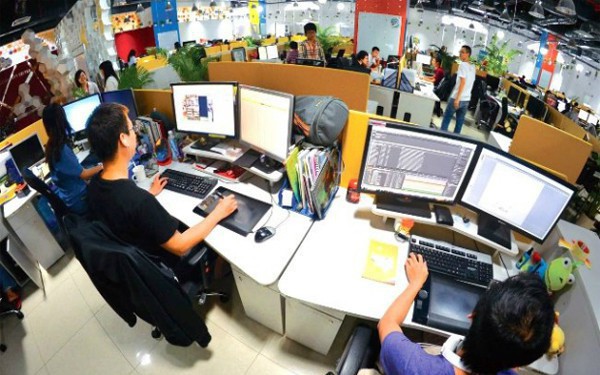
Vietnam's IT staff attract Japanese firms
A survey by the Ministry of Internal Affairs and Communications of Japan found that the application of new technologies in Japanese enterprises such as AI, IoT, robotics and self-propelled vehicles has been increasing rapidly.
As for the IT workforce, Japan is lacking 171,000 engineers and is expected to lack 369,000 engineers by 2020. It will also lack 48,000 engineers for new technologies by that time.
The labor shortage in Japan, according to analysts, will bring big benefits to Vietnam. The Programme for International Student Assessment (PISA) initiated by OECD found that Vietnamese students have study records among the top 20 countries. They are especially good at mathematics and science – the foundation for higher education on technology.
Other institutions also put Vietnam among the 10 most attractive markets in terms of software outsourcing with turnover from software exports increasing by 15 percent per annum. Japan remains the biggest market for Vietnam.Vietnam now has 290 universities and junior colleges training workers for the IT industry, where 55,000 students study each year. According to HackerRank, Vietnam ranks first in Southeast Asia in software development potential and 23rd in the world.
Kunihiko Togawa, CEO of DTS Sofyware Vietnam, who has experience working with partners from 40 countries, agrees that the young and qualified labor force is the outstanding advantage of Vietnam when compared with other countries.
However, he commented that the biggest disadvantage of Vietnam is that Vietnamese youth have big ambitions, and therefore, the job hopping rate in Vietnam is high. Many workers resign in less than one year.
“The high resignation rate increases businesses’ operation costs. I think this is a big problem for businesses,” he said.
Shigenaka Keitaro from Toshiba Vietnam, a subsidiary of Toshiba Group, agreed with Togawa, saying the young and qualified IT labor force is a great advantage, but the high job hopping rate is a big disadvantage.
“You are attached to the company just for very short time, so we do not have the confidence to assign long-term global projects to you,” he added.
Ta Son Tung, president of Rikkeisoft, whose name was listed in Forbes’ 2014 Vietnam 30 under 30, also said the labor shortage is a problem when doing business in Japan.
Tung recruits workers directly from universities. In addition, the firm sends staff to Japan to upgrade their professional and foreign language skills.
Meanwhile, experts believe that offering fair treatment and good business culture are effective measures to retain talents.
